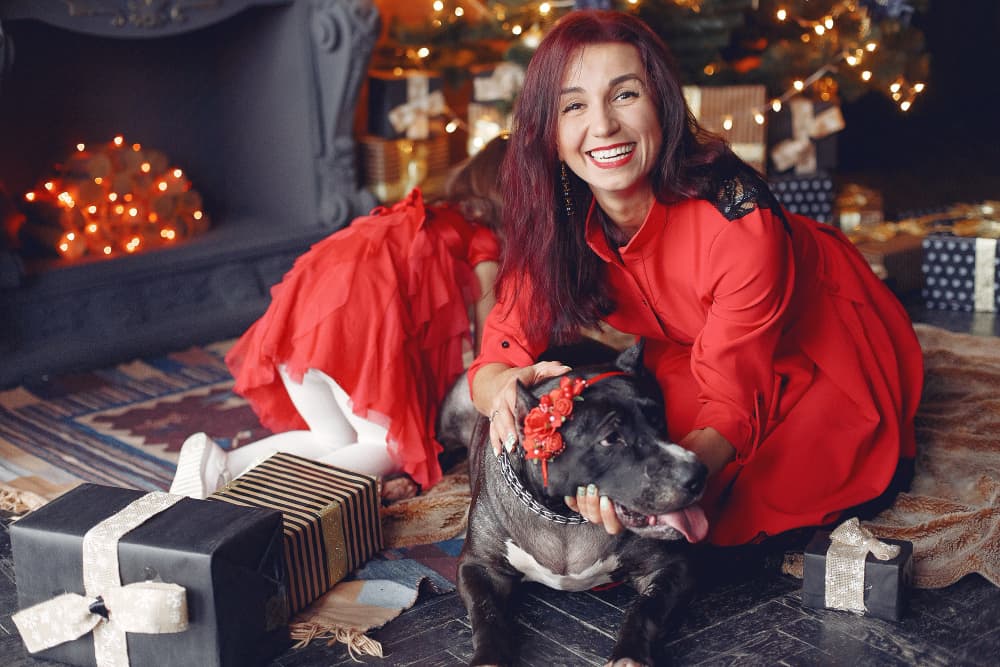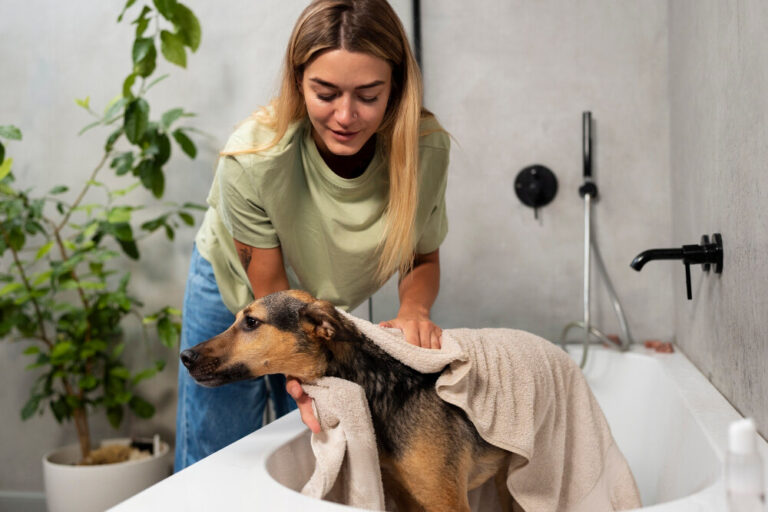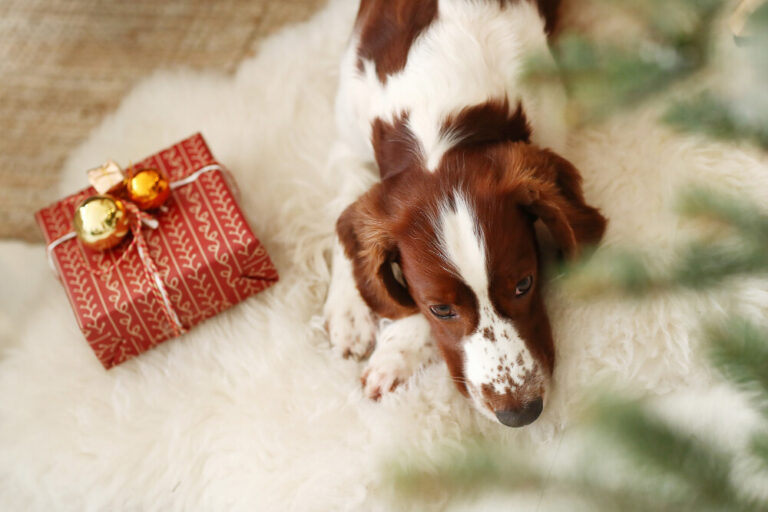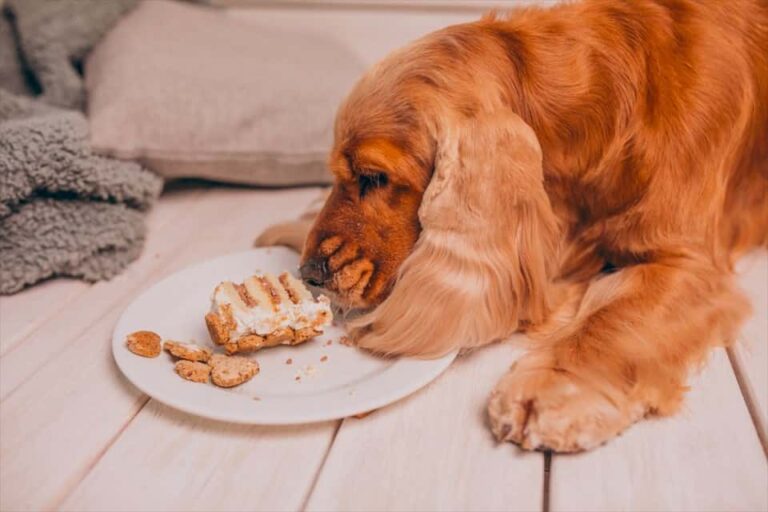Keeping Pets Safe at Christmas: Essential Tips for a Joyful Holiday Season

The holiday season is a time for joy, family gatherings, and festive decorations, but keeping pets safe at Christmas should also be a top priority for pet owners. Christmas can bring about potential hazards for pets, from toxic foods to hazardous decorations. With a few simple precautions, you can ensure your pets enjoy the holiday season safely alongside you and your family.
Why Is Pet Safety Important During Christmas?
Christmas brings a host of new sights, smells, and sounds that can overwhelm or even harm your pets. From the temptation of holiday treats to the allure of colorful lights and shiny ornaments, there’s no shortage of potential dangers lurking around. 740 Bark Avenue reminds you that keeping your pets safe during the holidays not only ensures they stay healthy but also allows you to enjoy the festivities worry-free.
7 Essential Tips for Keeping Pets Safe at Christmas
Avoid Toxic Foods for Pets
Holiday feasts often include foods that are highly toxic to pets. Keep these items well out of reach:
Chocolate
A common Christmas treat that is highly toxic to both dogs and cats. Chocolate contains theobromine, which can lead to poisoning.
Grapes and raisins
These fruits can cause kidney failure in dogs and should be kept far from curious mouths.
Xylitol
Found in sugar-free products like candy, gum, and baked goods, xylitol is extremely toxic to dogs and can lead to hypoglycemia and liver failure.
Onions, garlic, and alcohol
These common holiday ingredients can cause digestive distress, liver damage, and other serious issues for pets.
Secure Christmas Decorations
Decorating your home for Christmas can be a fun activity, but it’s essential to keep certain decorations out of your pet’s reach:
Christmas lights: Electrical cords can be a choking hazard, and chewing on them can lead to electrical burns or shocks. Use cord protectors or keep lights high up where pets can’t reach.
Ornaments: Glass ornaments and tinsel can pose a choking hazard or cause serious injuries if swallowed. Opt for shatterproof decorations and avoid hanging tinsel where pets can grab it.
Ribbons and bows: While they look festive, ribbons can be a choking hazard or cause gastrointestinal blockages if ingested. Be cautious when using them on presents or decorations.
Keep the Christmas Tree Safe
The Christmas tree is often the centerpiece of the holiday season, but it can also be a major danger zone for pets. Here’s how to protect your pet from the tree:
- Water in the tree stand: If you have a real Christmas tree, the water in the stand can contain harmful chemicals like pesticides or fertilizers. Keep the tree water covered or inaccessible to prevent your pet from drinking it.
- Tree stability: Make sure your tree is securely anchored. Pets, especially curious kittens and puppies, may try to climb the tree, causing it to tip over and potentially injuring themselves or others.
Avoid Harmful Plants
Certain holiday plants can be toxic to pets, so it’s important to know which ones to avoid:
- Poinsettias: While not as toxic as once believed, poinsettias can cause mild irritation in pets, such as nausea or vomiting.
- Mistletoe and holly: These festive plants are highly toxic to both dogs and cats. Ingesting them can cause severe reactions, including drooling, stomach upset, and even cardiovascular issues.
- Amaryllis: This beautiful flower can cause vomiting, diarrhea, and other symptoms if ingested by pets.
Watch Out for Small Gifts and Toys
Many Christmas gifts come with small parts or packaging that can be dangerous for pets:
Small gift items
Keep small toys, buttons, or batteries away from pets, as these can be choking hazards or lead to dangerous intestinal blockages if swallowed.
Gift wrappings and ribbons
Pets love to play with wrapping paper, bows, and ribbons, but these can cause serious harm if ingested. Make sure to clean up promptly after gift-giving.
Be Mindful of Stress and Anxiety
While Christmas is a time of joy for many, it can also be a source of stress for pets. New visitors, loud noises from parties, and changes in routine can make pets anxious. Here are some tips to help reduce holiday stress:
Create a quiet space
Set up a designated area where your pet can retreat from the chaos of the holiday season. This will give them a safe, quiet space to relax when needed.
Keep up with routines
Maintain your pet’s regular feeding, walking, and playtime routines to help them feel more secure.
Introduce visitors gradually
If you have holiday guests, introduce them to your pet slowly and ensure your pet is comfortable with the new faces.
Ensure Your Pet’s Identification is Up to Date
With all the excitement and activities around Christmas, pets can sometimes become lost or accidentally escape. Ensure your pet is wearing a collar with an ID tag that includes your current contact information. If your pet is microchipped, make sure the microchip details are up to date as well.
Conclusion
The holiday season is a time to celebrate, and by taking a few precautions, you can ensure your pets stay safe and healthy during Christmas. Keep toxic foods, dangerous decorations, and harmful plants out of reach, and create a calm environment for your pets to enjoy the festivities.
Remember, safety first—so you and your pets can have a Merry Christmas and a Happy New Year!
FAQs About Keeping Pets Safe at Christmas
What foods should I avoid giving my pet at Christmas?
Avoid chocolate, grapes, raisins, xylitol, onions, garlic, alcohol, and fatty foods—these are toxic or harmful to pets. Stick to pet-safe options.
Are Christmas trees safe for pets?
Secure the tree, cover the water stand, and avoid tinsel or glass ornaments to keep pets safe from tipping hazards, chemicals, and choking risks.
What holiday plants are toxic to pets?
Poinsettias, mistletoe, holly, and amaryllis are toxic if ingested. Keep them out of reach or use artificial versions to ensure your pet’s safety.
Can pets eat Christmas treats?
Skip human treats like cookies, chocolate, nuts, or xylitol-sweetened foods. Opt for pet-safe snacks made specifically for their dietary needs.
How can I reduce my pet’s anxiety during holiday gatherings?
Create a quiet, safe retreat for your pet, maintain routines, and use calming aids like pheromone diffusers or wraps to reduce holiday stress.
How do I make sure my pet’s identification is up to date during the holidays?
Ensure your pet’s ID tags and microchip info are current to help them return home quickly if they escape during holiday gatherings.
Tags
What do you think?
Related Articles

How to Build a Dog Wash Station: The Ultimate DIY Guide
Pet ownership is a rewarding experience, but it comes with responsibilities—like keeping your furry friend clean and healthy. Did you know that nearly 67% of

10 Useful Gift Ideas for New Dog Owners
A dog owner needs a lot of things to take care of his/her dog properly. If you want to gift something to a dog owner,

Do Dogs Get Bored of Their Food?
Ever wonder if your pup gets bored of eating the same kibble every day? You’re not alone! Many pet owners notice their dogs losing interest
